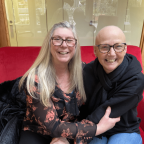
Four in five people in the South West believe veterans with PTSD would struggle to stay in work
YouGov poll for The Poppy Factory indicates scale of challenge for those with mental health conditions, especially at Christmas
At least 4 in 5 (85 per cent) people in the South West of England think it would be difficult for someone living with post-traumatic stress disorder (PTSD) to stay in paid work for 12 months or longer, new research1 shows.
The poll of 204 adults in the region was carried out by The Poppy Factory, which helps wounded, injured and sick veterans back into work in communities across the South West.
It was commissioned as part of the charity’s Working With PTSD campaign, which shows that with the right support, a veteran living with PTSD who may be struggling to fit into the civilian world can move into meaningful long-term employment.
Just five per cent of those polled by YouGov said it would not be difficult for someone with PTSD to stay in work for a year or longer, compared to 39 per cent who felt it would be very difficult and 46 per cent who said it would be fairly difficult. The other 10 per cent said they did not know.
Yet more than half of those who took part in the survey in the region (52 per cent) said they had worked alongside someone who they knew had a mental health condition, and nearly three quarters (74 per cent) had heard of post-traumatic stress disorder and knew how it might affect someone.
Deirdre Mills, Chief Executive of The Poppy Factory, said: “We know from experience that those who struggle with post-traumatic stress disorder can find it very challenging to stay in a job.
But with the right support over the long term, they often become the most dedicated, passionate and successful workers.
“Four fifths of the ex-Forces men and women who are helped by The Poppy Factory have mental health conditions and many have complex cases of PTSD. Yet we have been able to help more than 1,000 veterans back into work across the UK since 2010, including around 150 in the South West.
“By supporting The Poppy Factory’s Working With PTSD campaign, you can help these men and women secure the positive futures they deserve.”
Veteran Mark Collin, 53, from Sidmouth in Devon, who was medically discharged from the Navy with PTSD following service in the Falklands, Afghanistan and Bosnia, said The Poppy Factory’s regional Employability Consultant, Farrah Webb, helped him turn things around and find a new job in construction after a difficult period.
Mark said: “I was 16 when I joined the Navy and 34 when I left. I had nothing else in life. I found it very difficult to adapt to civilian life. My first marriage broke down while I was in the Forces as a result of my PTSD and it was hard to keep a job down.
“I spoke to Farrah from The Poppy Factory and she was one of the first people to say she was there to help. It was a good conversation that made me feel positive.
“Going back to work has really helped with my PTSD. I am in a better environment and it’s helped me with anxiety. I still get highs and lows as is expected, but I’m a lot happier.”
People in the South West also felt that being able to pay rent and bills and having a good support network are much more important for those with mental health challenges at Christmas than being given presents and cards or going to social events.
Of those surveyed, 4 in 5 (84 per cent) felt that having supportive family, friends or co-workers is important for those with mental health conditions at Christmas.
Being able to pay rent and water, rent, electricity and gas bills was next on the list of priorities during the festive season, according to at least 3 in 5 (64 per cent) of those polled.
Nearly half (45 per cent) felt that having a paid job is important for those with mental health challenges during Christmas. This is alongside the need for traditional festive activities like having social events to go to (39 per cent) or being given presents and cards (43 per cent).
Find out more at www.poppyfactory.org/workingwithPTSD






















